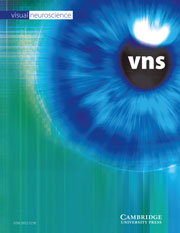Article contents
Fixational ocular motor control is plastic despite visual deprivation
Published online by Cambridge University Press: 30 October 2002
Abstract
The aim of this study was to assess the plasticity of human voluntary fixational eye movement control in relation to visual experience/chronic visual deprivation. Twelve blind adults participated (self-reported vision ≤ light perception in each eye; age range = 23–56 years; visual experience range = 0–28 years; blindness duration range = 6–55 years). Infrared-based recordings of horizontal eye movements were made before, during, and immediately after three 30-s periods of auditory ocular motor feedback, while participants were instructed to look straight ahead and keep their eyes as steady as possible. Percent change in horizontal displacement of the eye during and after feedback was compared with the no-feedback baseline. Eleven of the 12 individuals demonstrated feedback-mediated increase in eye stability, which improved as a function of visual experience. Improved eye stability was inversely related to duration of blindness. Clearly, blind adults can use nonvisual external feedback to stabilize gaze. Thus, the fixational subsystem can exhibit improved voluntary control despite chronic visual deprivation. Possible cortical and subcortical mechanisms are discussed.
- Type
- Research Article
- Information
- Copyright
- 2002 Cambridge University Press
- 5
- Cited by


